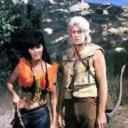Yahoo Answers is shutting down on May 4th, 2021 (Eastern Time) and beginning April 20th, 2021 (Eastern Time) the Yahoo Answers website will be in read-only mode. There will be no changes to other Yahoo properties or services, or your Yahoo account. You can find more information about the Yahoo Answers shutdown and how to download your data on this help page.
Trending News
What is the definition of a "classical liberal"?
12 Answers
- K~WOOLv 61 decade agoFavorite Answer
Classical liberalism is a philosophy committed to the ideal of limited government, liberty of individuals including freedom of religion, speech, press, assembly, and free markets.[1]
Classical liberalism developed in the 19th century in Western Europe, and the Americas. Although classical liberalism built on ideas that had already developed by the end of the 18th century, it advocated a specific kind of society, government and public policy required as a result of the Industrial Revolution and urbanization.[2] Notable individuals who have contributed to classical liberalism include Jean-Baptiste Say, Thomas Malthus and David Ricardo.[3] It drew on the economics of Adam Smith, a psychological understanding of individual liberty, natural law and utilitarianism, and a belief in progress. Classical liberals established political parties that were called "liberal", although in the United States classical liberalism came to dominate both existing major political parties.[1] There was a revival of interest in classical liberalism in the 20th century led by Friedrich Hayek and Milton Friedman.[4]
In the late 19th century, classical liberalism developed into neo-classical liberalism, which argued for government to be as small as possible in order to allow the exercise of individual freedom. In its most extreme form, it advocated Social Darwinism. Libertarianism is a modern form of neo-classical liberalism.[5]
The term classical liberalism was applied in retrospect to distinguish earlier 19th-century liberalism from the newer social liberalism.[6] The phrase classical liberalism is also sometimes used to refer to all forms of liberalism before the 20th century, and some conservatives and libertarians use the term classical liberalism to describe their belief in the primacy of economic freedom and minimal government. It is not always clear which meaning is intended.[7][8][9]
Source(s): Wikipedia. - Anonymous6 years ago
This Site Might Help You.
RE:
What is the definition of a "classical liberal"?
Source(s): definition quot classical liberal quot: https://tr.im/RTtrV - How do you think about the answers? You can sign in to vote the answer.
- Anonymous1 decade ago
One would immediatley say a liberal with class, but we know that will never happen.
I liken a liberal to wolverine with a bad tooth, One who runs around attacking and
attacking with no sense of why just do. Quick to blame, assign blame and never
include themselves in the mix of the blame or problem. They are always the
part of the problem and never part of the solution.
- andyLv 71 decade ago
The classical definition of liberal is one who is against the Monarchy rule and wants a representative government. That is different then the modern definition of liberal which is Strong Government rule based on Marx and is either socialist or communist in nature.
- ?Lv 41 decade ago
Classic liberals:
Founding father's of America is the best example.
Support separation of church and state, religious tolerance and open mindedness.
Supports freedom of speech, freedom of the press and other forms of expression.
Supportive of individual rights and the individual's right to bear arms against tyranny.
Supportive of capitalism, free trade and a free market.
Opposed to authoritarianism.
Basically, the opposite of what liberal means today.
- 1 decade ago
Classical liberalism is synonymous to the concept of "negative liberty", in which freedom is the result of the lack of government intrusion. "Positive liberty", which is what modern liberalism is based on, implies that freedom is the result of enabling factors which are provided by the government.
,
- Anonymous1 decade ago
Surely you mean "classic", not "classical". I suppose Atticus Finch in To Kill a Mockingbird could loosely be called a classical Liberal. Home schooled?
- Anonymous1 decade ago
In short:
A person who believes in a limited role of government and strict commitment to freedom of press, religion, speech, assembly and free markets.
I emphasize on strict.




